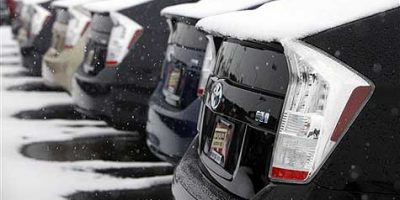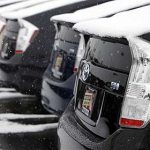
Toyota has its source code exposed for five years, impacting 300,000 drivers. Source: Pic: AP.
Toyota’s billion dollar hybrid dream
- Late to the electric vehicle race, Japanese carmakers accelerate plans as sales grow.
- Toyota Motors will invest 1.5 trillion yen (US$13.6 billion) in batteries used for electric and Toyota’s hybrid vehicles by 2030
In May this year, Toyota Motor Corp’s executive Jun Nagata told a media conference that by 2030, the price of batteries for electric vehicles (EVs) and the provision of infrastructure around the globe wouldn’t have advanced all that much. The group believes hybrids and plug-in hybrids will be an easier purchase for consumers.
The Japanese company which has reclaimed its place as the world’s best-selling automaker will be investing 1.5 trillion yen (US$13.6 billion) in batteries used for electric and Toyota’s hybrid vehicles by 2030, the company announced earlier this month. Toyota however did not disclose any plans or locations for new factories. It did however say it planned 10 production lines by 2025 — which will eventually reach 70. A single factory can contain several production lines.
Basically, the automaker is doubling down on its commitment to a technology it pioneered — hybrid vehicles. A typical Toyota’s hybrid is fueled with gasoline but also has an electric motor that raises fuel efficiency. Investments are likely to be made in the automaker’s major markets, including China and the US. Meanwhile, in Japan, the company is planning to expand production through a joint venture with Panasonic.
To recall, in May also, Toyota announced it aims to sell eight million electric and hybrid vehicles by 2030. That target includes 2 million EVs and fuel cell vehicles. By region, electric or fuel-cell vehicles will represent 40% of their sales in Europe, 15% in North America, and 10% in Japan.
Separately, during the Shanghai International Automobile Industry Exhibition in April, Toyota said it would launch 15 EV models by 2025, including one jointly developed with compatriot Subaru that is to be released next year. The announcement was the first indication that Toyota intends to develop a full line of eco-friendly vehicles.
Overall, Toyota’s spending on batteries for electric cars is set to reach about 160 billion yen in the fiscal year ending March 2022, double the previous year. The company is expanding production lines of a battery subsidiary, Prime Planet Energy & Solutions, in Japan’s Hyogo Prefecture and Dalian, China.
Reports also claim that another of Toyota’s subsidiaries, Primearth EV Energy, is also expected to increase production capacity at its sites in Japan’s Miyagi Prefecture and China.
Its Toyota’s hybrid dream against the world
For years, Toyota said it didn’t think battery-powered cars were a good solution to climate- and pollution-related concerns because the batteries were too expensive and took too long to charge. The company viewed hybrid gas-electric vehicles, which it pioneered, as the better option.
It has been slower than some competitors to bring an electric car to the market because it wants to offer consumers a good combination of safety, price and performance, according to Toyota’s chief technology officer Masahiko Maeda.
Toyota’s plan contrasts with rivals including domestic competitor Honda Motor Co. The new chief executive of Honda, Toshihiro Mibe, said in April that he wanted 40% of Honda’s vehicles to be fully electric by 2030, both globally and in North America. By 2040, all Honda vehicles globally will be fully electric.
Volkswagen AG , which sells roughly the same number of vehicles as Toyota, has said it would invest in six large battery factories and operate 18,000 public fast-charging stations in Europe by 2025.
READ MORE
- Ethical AI: The renewed importance of safeguarding data and customer privacy in Generative AI applications
- How Japan balances AI-driven opportunities with cybersecurity needs
- Deploying SASE: Benchmarking your approach
- Insurance everywhere all at once: the digital transformation of the APAC insurance industry
- Google parent Alphabet eyes HubSpot: A potential acquisition shaping the future of CRM


